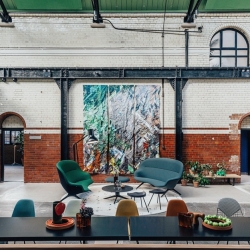To provide the best experiences, we use technologies like cookies to store and/or access device information. Consenting to these technologies will allow us to process data such as browsing behaviour or unique IDs on this site. Not consenting or withdrawing consent, may adversely affect certain features and functions.
The technical storage or access is strictly necessary for the legitimate purpose of enabling the use of a specific service explicitly requested by the subscriber or user, or for the sole purpose of carrying out the transmission of a communication over an electronic communications network.
The technical storage or access is necessary for the legitimate purpose of storing preferences that are not requested by the subscriber or user.
The technical storage or access that is used exclusively for statistical purposes.
The technical storage or access that is used exclusively for anonymous statistical purposes. Without a subpoena, voluntary compliance on the part of your Internet Service Provider, or additional records from a third party, information stored or retrieved for this purpose alone cannot usually be used to identify you.
The technical storage or access is required to create user profiles to send advertising, or to track the user on a website or across several websites for similar marketing purposes.
 The organisers of NeoCon have announced that seven new brands have signed on for permanent showrooms at the show’s venue THE MART in Chicago. Anda number of companies are extending their leases ahead of the 2023 edition of NeoCon, the leading commercial design trade show, which takes place from the 12th to the 14th of June. The brisk leasing activity, alongside a roster of new exhibitors, and a milestone building renovation project helmed by Gensler Chicago, reinforces THE MART as an important strategic hub for both emerging and established brands based in the US and abroad. (more…)
The organisers of NeoCon have announced that seven new brands have signed on for permanent showrooms at the show’s venue THE MART in Chicago. Anda number of companies are extending their leases ahead of the 2023 edition of NeoCon, the leading commercial design trade show, which takes place from the 12th to the 14th of June. The brisk leasing activity, alongside a roster of new exhibitors, and a milestone building renovation project helmed by Gensler Chicago, reinforces THE MART as an important strategic hub for both emerging and established brands based in the US and abroad. (more…)







 In 1989, Stephen Fry and Hugh Laurie, performed a TV sketch called Information. You can watch it below. It featured Stephen Fry sitting at a desk with a placard displaying the word “INFORMATION”. He asks, “Can I help you?” to which Hugh Laurie replies, “Oh, I would like some information, please”. Though, in the discussion, Hugh Laurie expects to get information without asking any questions, Stephen Fry explains that he has lots of information, such as “the average weight of a rabbit”. In response comes the statement, “Well, I didn’t know that, that there was an average weight of a rabbit!”
In 1989, Stephen Fry and Hugh Laurie, performed a TV sketch called Information. You can watch it below. It featured Stephen Fry sitting at a desk with a placard displaying the word “INFORMATION”. He asks, “Can I help you?” to which Hugh Laurie replies, “Oh, I would like some information, please”. Though, in the discussion, Hugh Laurie expects to get information without asking any questions, Stephen Fry explains that he has lots of information, such as “the average weight of a rabbit”. In response comes the statement, “Well, I didn’t know that, that there was an average weight of a rabbit!” 










 The Sustainable Design Collective, a ‘think tank’ group of leading workplace designers and specifiers, has announced a new Forum Day, together with industry awards, focussed on greater sustainability. Originally formed in January 2022, the Sustainable Design Collective hosts regular meetings to collaborate and discuss new opportunities to promote environmental and social responsibility within the office workplace. The group is now inviting conversations with fellow designers as well as suppliers and manufacturers.
The Sustainable Design Collective, a ‘think tank’ group of leading workplace designers and specifiers, has announced a new Forum Day, together with industry awards, focussed on greater sustainability. Originally formed in January 2022, the Sustainable Design Collective hosts regular meetings to collaborate and discuss new opportunities to promote environmental and social responsibility within the office workplace. The group is now inviting conversations with fellow designers as well as suppliers and manufacturers. 




 American employees are wasting hundreds of contracted work hours a year using their work equipment for personal tasks and activities, according to a new survey from ExpressVPN. The survey, conducted by the consumer privacy and security company, found that some people are spending only 33 percent of annual contracted hours on work tasks. With a steep rise in hybrid and home working in recent years, many companies have provided employees with work devices to use in the comfort of their own homes, including work laptops, desktops, phones, and microphones.
American employees are wasting hundreds of contracted work hours a year using their work equipment for personal tasks and activities, according to a new survey from ExpressVPN. The survey, conducted by the consumer privacy and security company, found that some people are spending only 33 percent of annual contracted hours on work tasks. With a steep rise in hybrid and home working in recent years, many companies have provided employees with work devices to use in the comfort of their own homes, including work laptops, desktops, phones, and microphones. 








April 7, 2023
The need for reimagination in an age of uncertainty
by Eugenia Anastassiou • Comment, Everything Omni